An Analysis of Hobbes' Laws of Nature and Obligation
VerifiedAdded on 2023/02/01
|12
|3913
|65
Essay
AI Summary
This essay analyzes Thomas Hobbes' concept of laws of nature and whether they serve as a source of obligation. It begins with an overview of Hobbes' philosophical contributions, emphasizing his social contract theory and the influence of his historical context, including religious and political conflicts. The essay then delves into Hobbes' specific laws of nature, particularly the first and second laws, exploring their implications for individual behavior and societal structures. It examines the debate surrounding the extent to which these laws create moral obligations, particularly concerning the relationship between individuals, the sovereign, and the pursuit of peace and self-preservation. The essay concludes by arguing that Hobbes' laws of nature, while promoting self-preservation and the pursuit of peace, do not necessarily impose obligations in the traditional sense, but rather, outline the rational means by which individuals can secure their own well-being and contribute to a stable society.
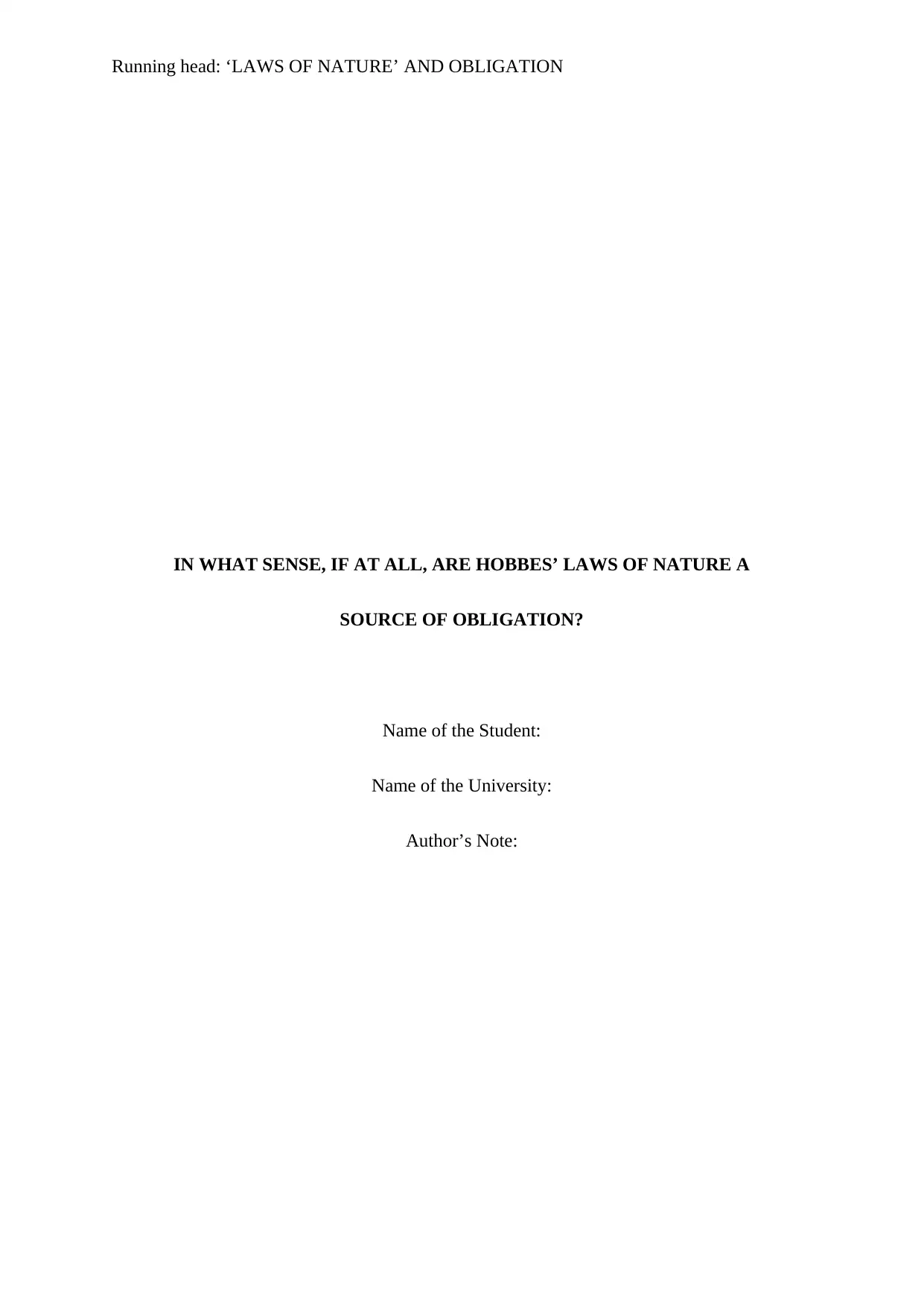
Running head: ‘LAWS OF NATURE’ AND OBLIGATION
IN WHAT SENSE, IF AT ALL, ARE HOBBES’ LAWS OF NATURE A
SOURCE OF OBLIGATION?
Name of the Student:
Name of the University:
Author’s Note:
IN WHAT SENSE, IF AT ALL, ARE HOBBES’ LAWS OF NATURE A
SOURCE OF OBLIGATION?
Name of the Student:
Name of the University:
Author’s Note:
Paraphrase This Document
Need a fresh take? Get an instant paraphrase of this document with our AI Paraphraser
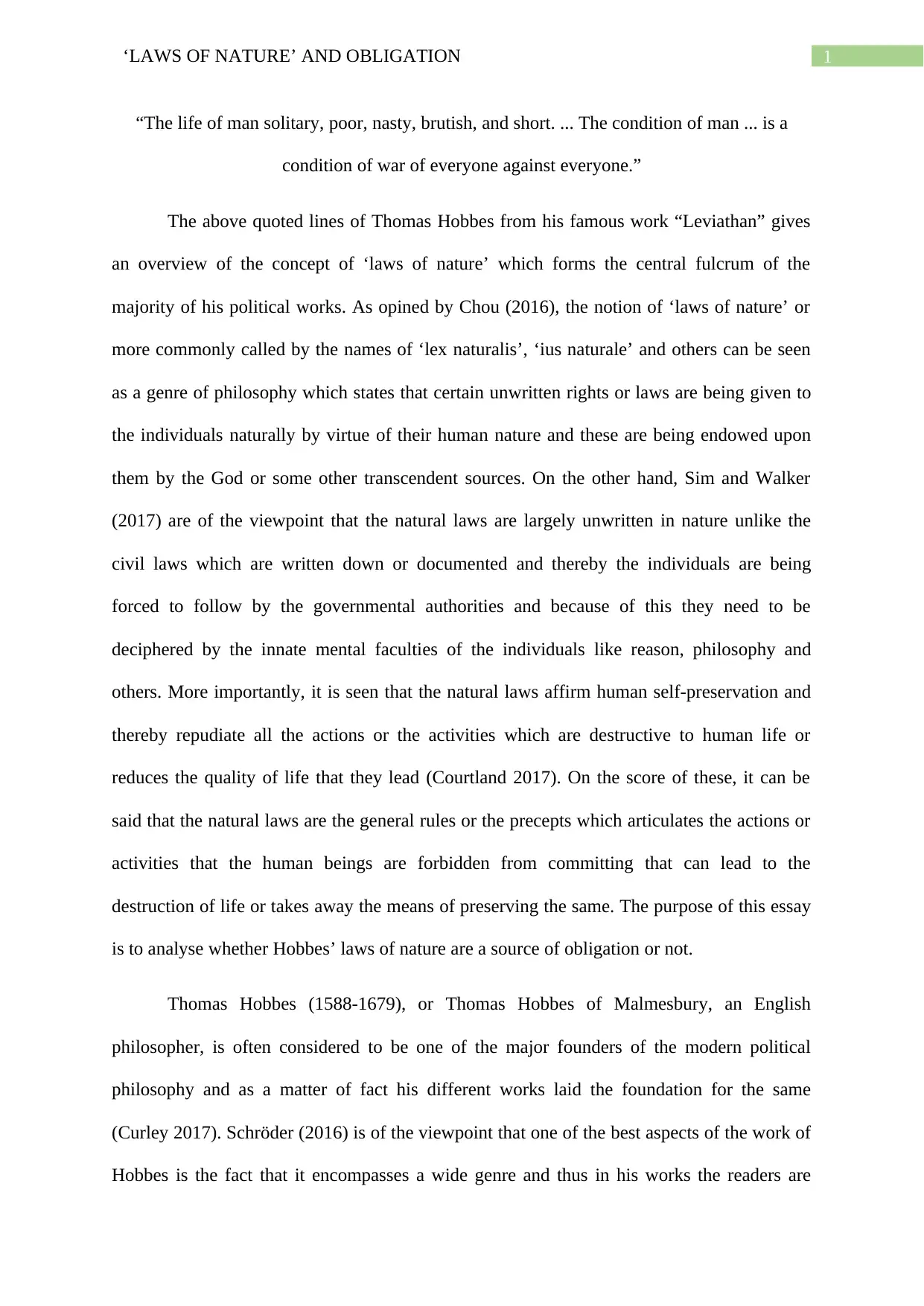
1‘LAWS OF NATURE’ AND OBLIGATION
“The life of man solitary, poor, nasty, brutish, and short. ... The condition of man ... is a
condition of war of everyone against everyone.”
The above quoted lines of Thomas Hobbes from his famous work “Leviathan” gives
an overview of the concept of ‘laws of nature’ which forms the central fulcrum of the
majority of his political works. As opined by Chou (2016), the notion of ‘laws of nature’ or
more commonly called by the names of ‘lex naturalis’, ‘ius naturale’ and others can be seen
as a genre of philosophy which states that certain unwritten rights or laws are being given to
the individuals naturally by virtue of their human nature and these are being endowed upon
them by the God or some other transcendent sources. On the other hand, Sim and Walker
(2017) are of the viewpoint that the natural laws are largely unwritten in nature unlike the
civil laws which are written down or documented and thereby the individuals are being
forced to follow by the governmental authorities and because of this they need to be
deciphered by the innate mental faculties of the individuals like reason, philosophy and
others. More importantly, it is seen that the natural laws affirm human self-preservation and
thereby repudiate all the actions or the activities which are destructive to human life or
reduces the quality of life that they lead (Courtland 2017). On the score of these, it can be
said that the natural laws are the general rules or the precepts which articulates the actions or
activities that the human beings are forbidden from committing that can lead to the
destruction of life or takes away the means of preserving the same. The purpose of this essay
is to analyse whether Hobbes’ laws of nature are a source of obligation or not.
Thomas Hobbes (1588-1679), or Thomas Hobbes of Malmesbury, an English
philosopher, is often considered to be one of the major founders of the modern political
philosophy and as a matter of fact his different works laid the foundation for the same
(Curley 2017). Schröder (2016) is of the viewpoint that one of the best aspects of the work of
Hobbes is the fact that it encompasses a wide genre and thus in his works the readers are
“The life of man solitary, poor, nasty, brutish, and short. ... The condition of man ... is a
condition of war of everyone against everyone.”
The above quoted lines of Thomas Hobbes from his famous work “Leviathan” gives
an overview of the concept of ‘laws of nature’ which forms the central fulcrum of the
majority of his political works. As opined by Chou (2016), the notion of ‘laws of nature’ or
more commonly called by the names of ‘lex naturalis’, ‘ius naturale’ and others can be seen
as a genre of philosophy which states that certain unwritten rights or laws are being given to
the individuals naturally by virtue of their human nature and these are being endowed upon
them by the God or some other transcendent sources. On the other hand, Sim and Walker
(2017) are of the viewpoint that the natural laws are largely unwritten in nature unlike the
civil laws which are written down or documented and thereby the individuals are being
forced to follow by the governmental authorities and because of this they need to be
deciphered by the innate mental faculties of the individuals like reason, philosophy and
others. More importantly, it is seen that the natural laws affirm human self-preservation and
thereby repudiate all the actions or the activities which are destructive to human life or
reduces the quality of life that they lead (Courtland 2017). On the score of these, it can be
said that the natural laws are the general rules or the precepts which articulates the actions or
activities that the human beings are forbidden from committing that can lead to the
destruction of life or takes away the means of preserving the same. The purpose of this essay
is to analyse whether Hobbes’ laws of nature are a source of obligation or not.
Thomas Hobbes (1588-1679), or Thomas Hobbes of Malmesbury, an English
philosopher, is often considered to be one of the major founders of the modern political
philosophy and as a matter of fact his different works laid the foundation for the same
(Curley 2017). Schröder (2016) is of the viewpoint that one of the best aspects of the work of
Hobbes is the fact that it encompasses a wide genre and thus in his works the readers are
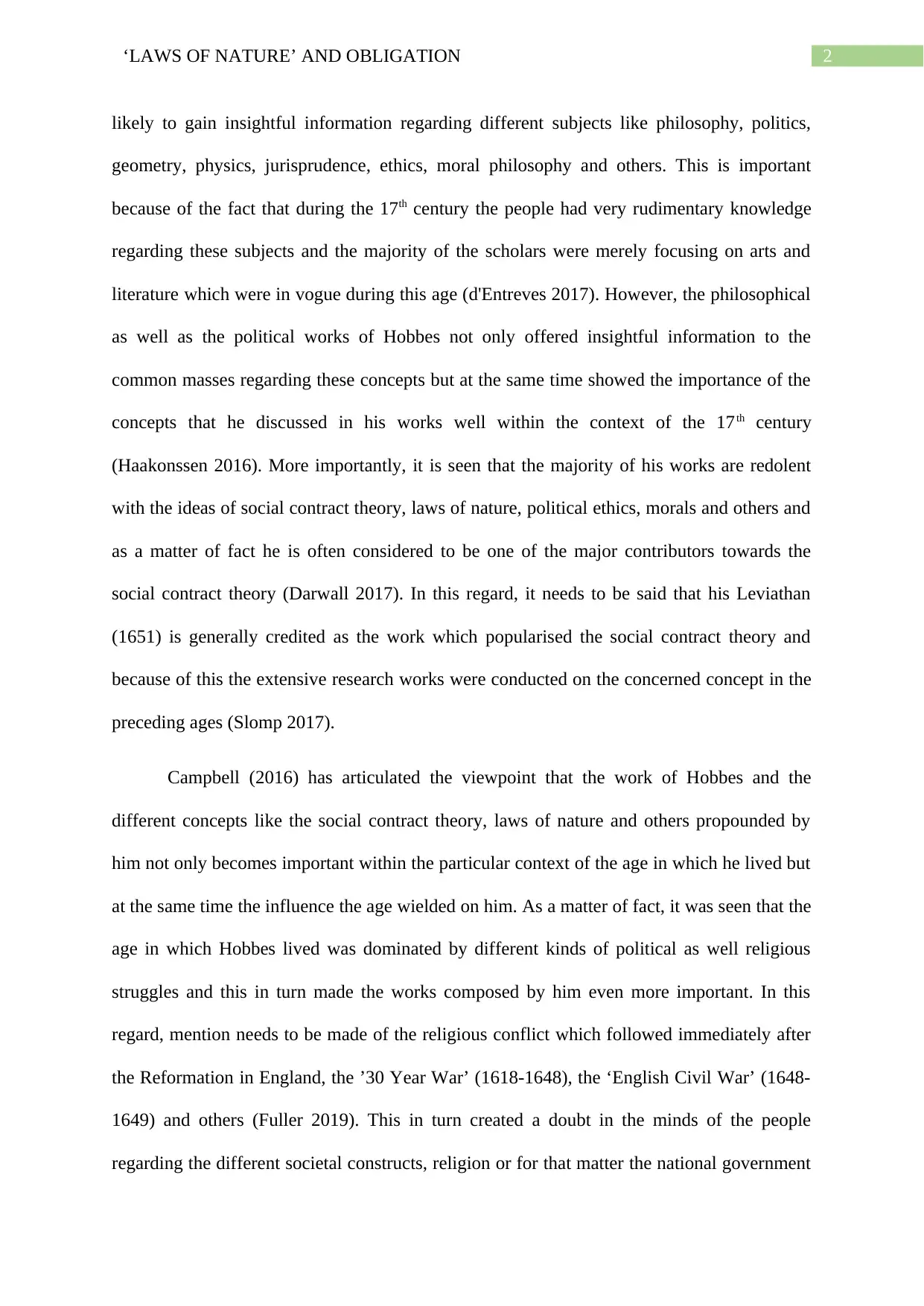
2‘LAWS OF NATURE’ AND OBLIGATION
likely to gain insightful information regarding different subjects like philosophy, politics,
geometry, physics, jurisprudence, ethics, moral philosophy and others. This is important
because of the fact that during the 17th century the people had very rudimentary knowledge
regarding these subjects and the majority of the scholars were merely focusing on arts and
literature which were in vogue during this age (d'Entreves 2017). However, the philosophical
as well as the political works of Hobbes not only offered insightful information to the
common masses regarding these concepts but at the same time showed the importance of the
concepts that he discussed in his works well within the context of the 17th century
(Haakonssen 2016). More importantly, it is seen that the majority of his works are redolent
with the ideas of social contract theory, laws of nature, political ethics, morals and others and
as a matter of fact he is often considered to be one of the major contributors towards the
social contract theory (Darwall 2017). In this regard, it needs to be said that his Leviathan
(1651) is generally credited as the work which popularised the social contract theory and
because of this the extensive research works were conducted on the concerned concept in the
preceding ages (Slomp 2017).
Campbell (2016) has articulated the viewpoint that the work of Hobbes and the
different concepts like the social contract theory, laws of nature and others propounded by
him not only becomes important within the particular context of the age in which he lived but
at the same time the influence the age wielded on him. As a matter of fact, it was seen that the
age in which Hobbes lived was dominated by different kinds of political as well religious
struggles and this in turn made the works composed by him even more important. In this
regard, mention needs to be made of the religious conflict which followed immediately after
the Reformation in England, the ’30 Year War’ (1618-1648), the ‘English Civil War’ (1648-
1649) and others (Fuller 2019). This in turn created a doubt in the minds of the people
regarding the different societal constructs, religion or for that matter the national government
likely to gain insightful information regarding different subjects like philosophy, politics,
geometry, physics, jurisprudence, ethics, moral philosophy and others. This is important
because of the fact that during the 17th century the people had very rudimentary knowledge
regarding these subjects and the majority of the scholars were merely focusing on arts and
literature which were in vogue during this age (d'Entreves 2017). However, the philosophical
as well as the political works of Hobbes not only offered insightful information to the
common masses regarding these concepts but at the same time showed the importance of the
concepts that he discussed in his works well within the context of the 17th century
(Haakonssen 2016). More importantly, it is seen that the majority of his works are redolent
with the ideas of social contract theory, laws of nature, political ethics, morals and others and
as a matter of fact he is often considered to be one of the major contributors towards the
social contract theory (Darwall 2017). In this regard, it needs to be said that his Leviathan
(1651) is generally credited as the work which popularised the social contract theory and
because of this the extensive research works were conducted on the concerned concept in the
preceding ages (Slomp 2017).
Campbell (2016) has articulated the viewpoint that the work of Hobbes and the
different concepts like the social contract theory, laws of nature and others propounded by
him not only becomes important within the particular context of the age in which he lived but
at the same time the influence the age wielded on him. As a matter of fact, it was seen that the
age in which Hobbes lived was dominated by different kinds of political as well religious
struggles and this in turn made the works composed by him even more important. In this
regard, mention needs to be made of the religious conflict which followed immediately after
the Reformation in England, the ’30 Year War’ (1618-1648), the ‘English Civil War’ (1648-
1649) and others (Fuller 2019). This in turn created a doubt in the minds of the people
regarding the different societal constructs, religion or for that matter the national government
⊘ This is a preview!⊘
Do you want full access?
Subscribe today to unlock all pages.

Trusted by 1+ million students worldwide
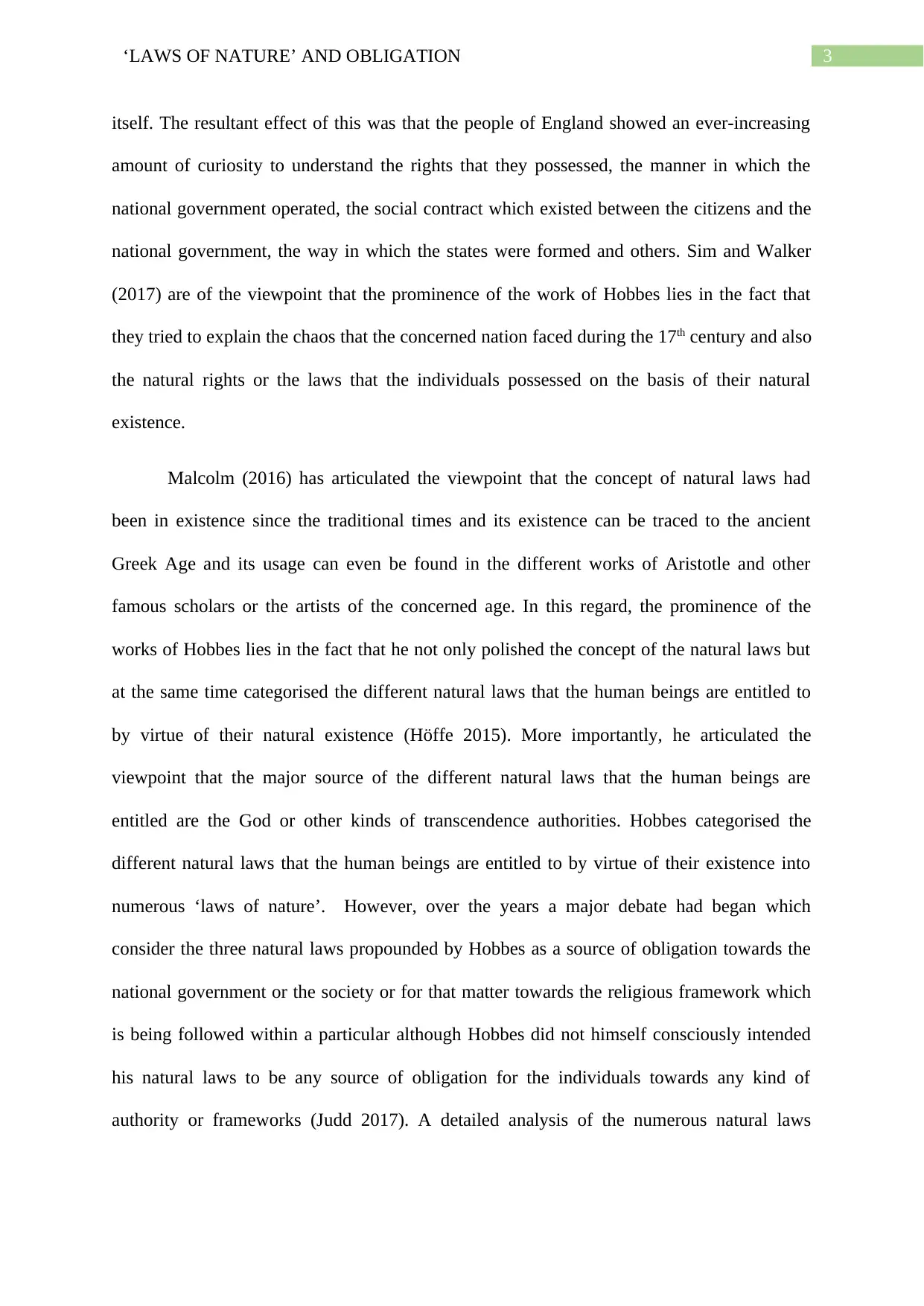
3‘LAWS OF NATURE’ AND OBLIGATION
itself. The resultant effect of this was that the people of England showed an ever-increasing
amount of curiosity to understand the rights that they possessed, the manner in which the
national government operated, the social contract which existed between the citizens and the
national government, the way in which the states were formed and others. Sim and Walker
(2017) are of the viewpoint that the prominence of the work of Hobbes lies in the fact that
they tried to explain the chaos that the concerned nation faced during the 17th century and also
the natural rights or the laws that the individuals possessed on the basis of their natural
existence.
Malcolm (2016) has articulated the viewpoint that the concept of natural laws had
been in existence since the traditional times and its existence can be traced to the ancient
Greek Age and its usage can even be found in the different works of Aristotle and other
famous scholars or the artists of the concerned age. In this regard, the prominence of the
works of Hobbes lies in the fact that he not only polished the concept of the natural laws but
at the same time categorised the different natural laws that the human beings are entitled to
by virtue of their natural existence (Höffe 2015). More importantly, he articulated the
viewpoint that the major source of the different natural laws that the human beings are
entitled are the God or other kinds of transcendence authorities. Hobbes categorised the
different natural laws that the human beings are entitled to by virtue of their existence into
numerous ‘laws of nature’. However, over the years a major debate had began which
consider the three natural laws propounded by Hobbes as a source of obligation towards the
national government or the society or for that matter towards the religious framework which
is being followed within a particular although Hobbes did not himself consciously intended
his natural laws to be any source of obligation for the individuals towards any kind of
authority or frameworks (Judd 2017). A detailed analysis of the numerous natural laws
itself. The resultant effect of this was that the people of England showed an ever-increasing
amount of curiosity to understand the rights that they possessed, the manner in which the
national government operated, the social contract which existed between the citizens and the
national government, the way in which the states were formed and others. Sim and Walker
(2017) are of the viewpoint that the prominence of the work of Hobbes lies in the fact that
they tried to explain the chaos that the concerned nation faced during the 17th century and also
the natural rights or the laws that the individuals possessed on the basis of their natural
existence.
Malcolm (2016) has articulated the viewpoint that the concept of natural laws had
been in existence since the traditional times and its existence can be traced to the ancient
Greek Age and its usage can even be found in the different works of Aristotle and other
famous scholars or the artists of the concerned age. In this regard, the prominence of the
works of Hobbes lies in the fact that he not only polished the concept of the natural laws but
at the same time categorised the different natural laws that the human beings are entitled to
by virtue of their natural existence (Höffe 2015). More importantly, he articulated the
viewpoint that the major source of the different natural laws that the human beings are
entitled are the God or other kinds of transcendence authorities. Hobbes categorised the
different natural laws that the human beings are entitled to by virtue of their existence into
numerous ‘laws of nature’. However, over the years a major debate had began which
consider the three natural laws propounded by Hobbes as a source of obligation towards the
national government or the society or for that matter towards the religious framework which
is being followed within a particular although Hobbes did not himself consciously intended
his natural laws to be any source of obligation for the individuals towards any kind of
authority or frameworks (Judd 2017). A detailed analysis of the numerous natural laws
Paraphrase This Document
Need a fresh take? Get an instant paraphrase of this document with our AI Paraphraser
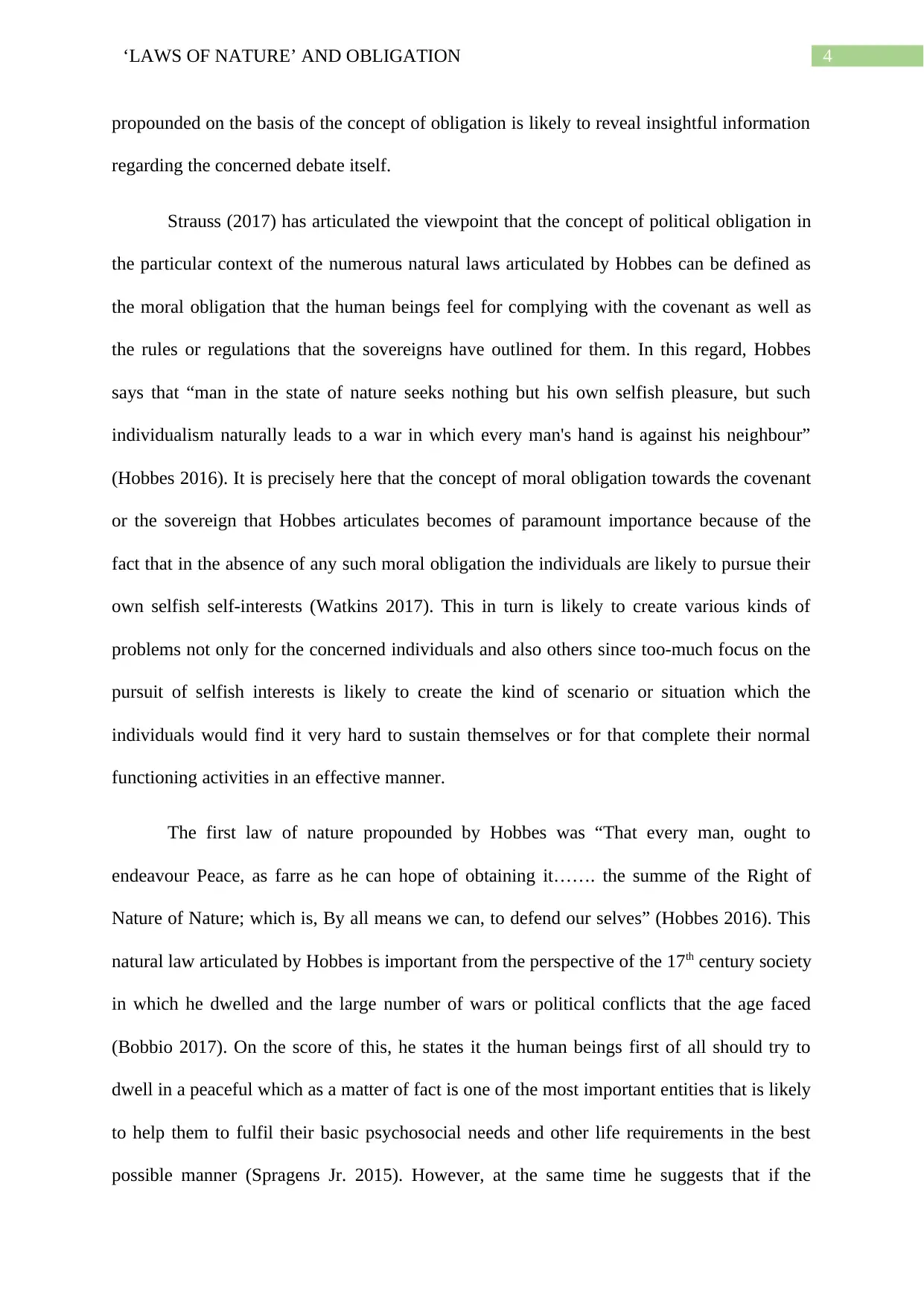
4‘LAWS OF NATURE’ AND OBLIGATION
propounded on the basis of the concept of obligation is likely to reveal insightful information
regarding the concerned debate itself.
Strauss (2017) has articulated the viewpoint that the concept of political obligation in
the particular context of the numerous natural laws articulated by Hobbes can be defined as
the moral obligation that the human beings feel for complying with the covenant as well as
the rules or regulations that the sovereigns have outlined for them. In this regard, Hobbes
says that “man in the state of nature seeks nothing but his own selfish pleasure, but such
individualism naturally leads to a war in which every man's hand is against his neighbour”
(Hobbes 2016). It is precisely here that the concept of moral obligation towards the covenant
or the sovereign that Hobbes articulates becomes of paramount importance because of the
fact that in the absence of any such moral obligation the individuals are likely to pursue their
own selfish self-interests (Watkins 2017). This in turn is likely to create various kinds of
problems not only for the concerned individuals and also others since too-much focus on the
pursuit of selfish interests is likely to create the kind of scenario or situation which the
individuals would find it very hard to sustain themselves or for that complete their normal
functioning activities in an effective manner.
The first law of nature propounded by Hobbes was “That every man, ought to
endeavour Peace, as farre as he can hope of obtaining it……. the summe of the Right of
Nature of Nature; which is, By all means we can, to defend our selves” (Hobbes 2016). This
natural law articulated by Hobbes is important from the perspective of the 17th century society
in which he dwelled and the large number of wars or political conflicts that the age faced
(Bobbio 2017). On the score of this, he states it the human beings first of all should try to
dwell in a peaceful which as a matter of fact is one of the most important entities that is likely
to help them to fulfil their basic psychosocial needs and other life requirements in the best
possible manner (Spragens Jr. 2015). However, at the same time he suggests that if the
propounded on the basis of the concept of obligation is likely to reveal insightful information
regarding the concerned debate itself.
Strauss (2017) has articulated the viewpoint that the concept of political obligation in
the particular context of the numerous natural laws articulated by Hobbes can be defined as
the moral obligation that the human beings feel for complying with the covenant as well as
the rules or regulations that the sovereigns have outlined for them. In this regard, Hobbes
says that “man in the state of nature seeks nothing but his own selfish pleasure, but such
individualism naturally leads to a war in which every man's hand is against his neighbour”
(Hobbes 2016). It is precisely here that the concept of moral obligation towards the covenant
or the sovereign that Hobbes articulates becomes of paramount importance because of the
fact that in the absence of any such moral obligation the individuals are likely to pursue their
own selfish self-interests (Watkins 2017). This in turn is likely to create various kinds of
problems not only for the concerned individuals and also others since too-much focus on the
pursuit of selfish interests is likely to create the kind of scenario or situation which the
individuals would find it very hard to sustain themselves or for that complete their normal
functioning activities in an effective manner.
The first law of nature propounded by Hobbes was “That every man, ought to
endeavour Peace, as farre as he can hope of obtaining it……. the summe of the Right of
Nature of Nature; which is, By all means we can, to defend our selves” (Hobbes 2016). This
natural law articulated by Hobbes is important from the perspective of the 17th century society
in which he dwelled and the large number of wars or political conflicts that the age faced
(Bobbio 2017). On the score of this, he states it the human beings first of all should try to
dwell in a peaceful which as a matter of fact is one of the most important entities that is likely
to help them to fulfil their basic psychosocial needs and other life requirements in the best
possible manner (Spragens Jr. 2015). However, at the same time he suggests that if the
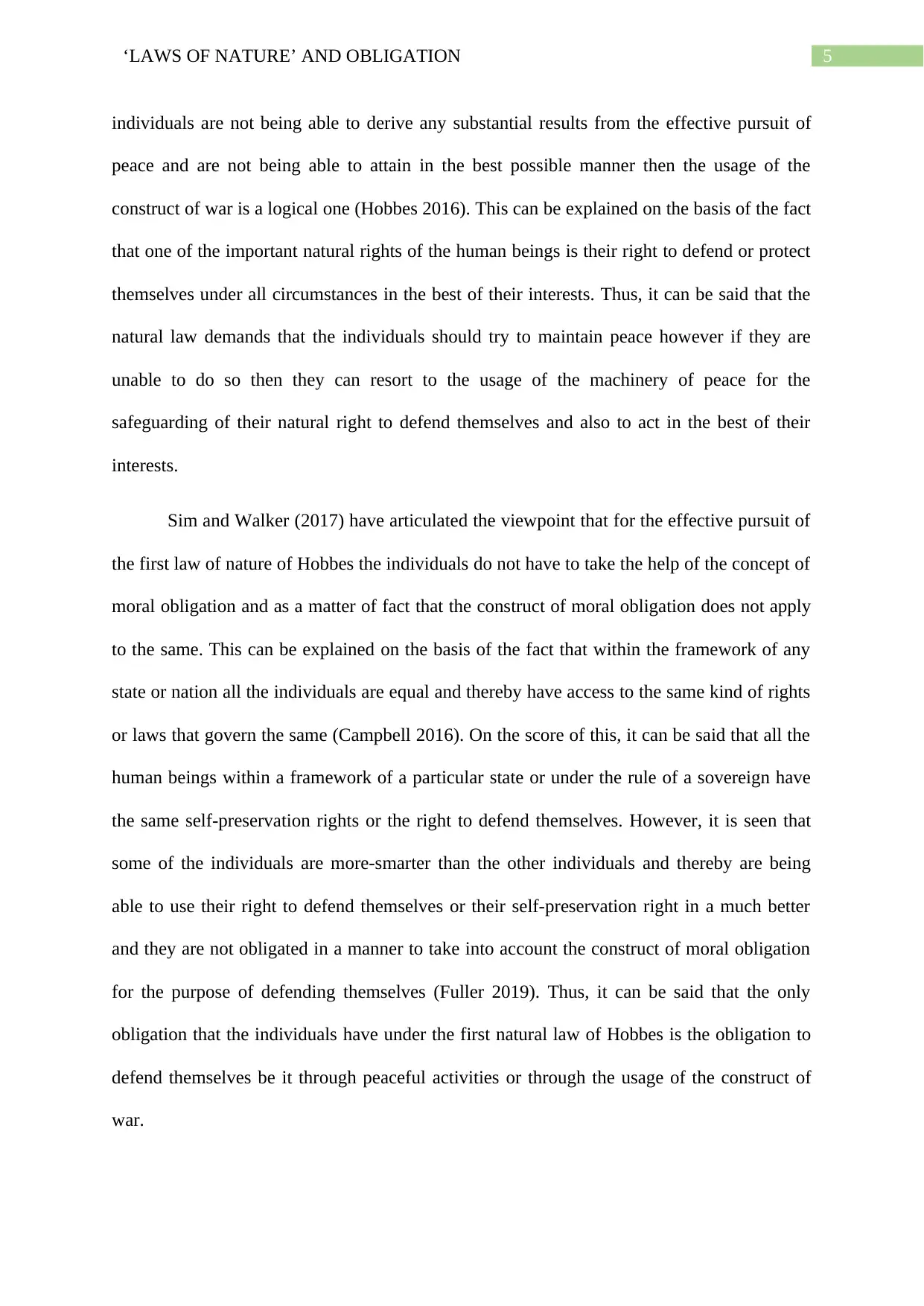
5‘LAWS OF NATURE’ AND OBLIGATION
individuals are not being able to derive any substantial results from the effective pursuit of
peace and are not being able to attain in the best possible manner then the usage of the
construct of war is a logical one (Hobbes 2016). This can be explained on the basis of the fact
that one of the important natural rights of the human beings is their right to defend or protect
themselves under all circumstances in the best of their interests. Thus, it can be said that the
natural law demands that the individuals should try to maintain peace however if they are
unable to do so then they can resort to the usage of the machinery of peace for the
safeguarding of their natural right to defend themselves and also to act in the best of their
interests.
Sim and Walker (2017) have articulated the viewpoint that for the effective pursuit of
the first law of nature of Hobbes the individuals do not have to take the help of the concept of
moral obligation and as a matter of fact that the construct of moral obligation does not apply
to the same. This can be explained on the basis of the fact that within the framework of any
state or nation all the individuals are equal and thereby have access to the same kind of rights
or laws that govern the same (Campbell 2016). On the score of this, it can be said that all the
human beings within a framework of a particular state or under the rule of a sovereign have
the same self-preservation rights or the right to defend themselves. However, it is seen that
some of the individuals are more-smarter than the other individuals and thereby are being
able to use their right to defend themselves or their self-preservation right in a much better
and they are not obligated in a manner to take into account the construct of moral obligation
for the purpose of defending themselves (Fuller 2019). Thus, it can be said that the only
obligation that the individuals have under the first natural law of Hobbes is the obligation to
defend themselves be it through peaceful activities or through the usage of the construct of
war.
individuals are not being able to derive any substantial results from the effective pursuit of
peace and are not being able to attain in the best possible manner then the usage of the
construct of war is a logical one (Hobbes 2016). This can be explained on the basis of the fact
that one of the important natural rights of the human beings is their right to defend or protect
themselves under all circumstances in the best of their interests. Thus, it can be said that the
natural law demands that the individuals should try to maintain peace however if they are
unable to do so then they can resort to the usage of the machinery of peace for the
safeguarding of their natural right to defend themselves and also to act in the best of their
interests.
Sim and Walker (2017) have articulated the viewpoint that for the effective pursuit of
the first law of nature of Hobbes the individuals do not have to take the help of the concept of
moral obligation and as a matter of fact that the construct of moral obligation does not apply
to the same. This can be explained on the basis of the fact that within the framework of any
state or nation all the individuals are equal and thereby have access to the same kind of rights
or laws that govern the same (Campbell 2016). On the score of this, it can be said that all the
human beings within a framework of a particular state or under the rule of a sovereign have
the same self-preservation rights or the right to defend themselves. However, it is seen that
some of the individuals are more-smarter than the other individuals and thereby are being
able to use their right to defend themselves or their self-preservation right in a much better
and they are not obligated in a manner to take into account the construct of moral obligation
for the purpose of defending themselves (Fuller 2019). Thus, it can be said that the only
obligation that the individuals have under the first natural law of Hobbes is the obligation to
defend themselves be it through peaceful activities or through the usage of the construct of
war.
⊘ This is a preview!⊘
Do you want full access?
Subscribe today to unlock all pages.

Trusted by 1+ million students worldwide
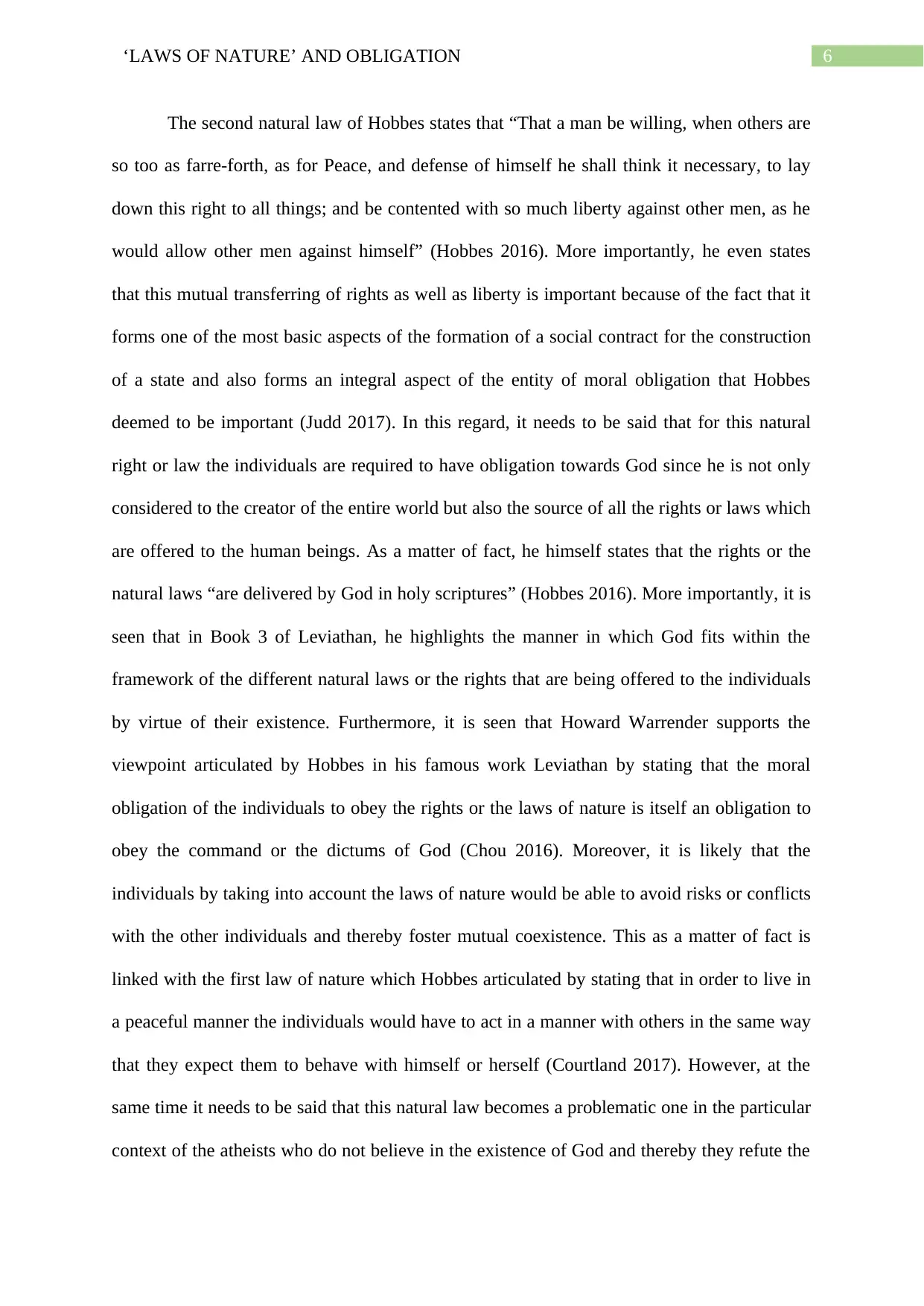
6‘LAWS OF NATURE’ AND OBLIGATION
The second natural law of Hobbes states that “That a man be willing, when others are
so too as farre-forth, as for Peace, and defense of himself he shall think it necessary, to lay
down this right to all things; and be contented with so much liberty against other men, as he
would allow other men against himself” (Hobbes 2016). More importantly, he even states
that this mutual transferring of rights as well as liberty is important because of the fact that it
forms one of the most basic aspects of the formation of a social contract for the construction
of a state and also forms an integral aspect of the entity of moral obligation that Hobbes
deemed to be important (Judd 2017). In this regard, it needs to be said that for this natural
right or law the individuals are required to have obligation towards God since he is not only
considered to the creator of the entire world but also the source of all the rights or laws which
are offered to the human beings. As a matter of fact, he himself states that the rights or the
natural laws “are delivered by God in holy scriptures” (Hobbes 2016). More importantly, it is
seen that in Book 3 of Leviathan, he highlights the manner in which God fits within the
framework of the different natural laws or the rights that are being offered to the individuals
by virtue of their existence. Furthermore, it is seen that Howard Warrender supports the
viewpoint articulated by Hobbes in his famous work Leviathan by stating that the moral
obligation of the individuals to obey the rights or the laws of nature is itself an obligation to
obey the command or the dictums of God (Chou 2016). Moreover, it is likely that the
individuals by taking into account the laws of nature would be able to avoid risks or conflicts
with the other individuals and thereby foster mutual coexistence. This as a matter of fact is
linked with the first law of nature which Hobbes articulated by stating that in order to live in
a peaceful manner the individuals would have to act in a manner with others in the same way
that they expect them to behave with himself or herself (Courtland 2017). However, at the
same time it needs to be said that this natural law becomes a problematic one in the particular
context of the atheists who do not believe in the existence of God and thereby they refute the
The second natural law of Hobbes states that “That a man be willing, when others are
so too as farre-forth, as for Peace, and defense of himself he shall think it necessary, to lay
down this right to all things; and be contented with so much liberty against other men, as he
would allow other men against himself” (Hobbes 2016). More importantly, he even states
that this mutual transferring of rights as well as liberty is important because of the fact that it
forms one of the most basic aspects of the formation of a social contract for the construction
of a state and also forms an integral aspect of the entity of moral obligation that Hobbes
deemed to be important (Judd 2017). In this regard, it needs to be said that for this natural
right or law the individuals are required to have obligation towards God since he is not only
considered to the creator of the entire world but also the source of all the rights or laws which
are offered to the human beings. As a matter of fact, he himself states that the rights or the
natural laws “are delivered by God in holy scriptures” (Hobbes 2016). More importantly, it is
seen that in Book 3 of Leviathan, he highlights the manner in which God fits within the
framework of the different natural laws or the rights that are being offered to the individuals
by virtue of their existence. Furthermore, it is seen that Howard Warrender supports the
viewpoint articulated by Hobbes in his famous work Leviathan by stating that the moral
obligation of the individuals to obey the rights or the laws of nature is itself an obligation to
obey the command or the dictums of God (Chou 2016). Moreover, it is likely that the
individuals by taking into account the laws of nature would be able to avoid risks or conflicts
with the other individuals and thereby foster mutual coexistence. This as a matter of fact is
linked with the first law of nature which Hobbes articulated by stating that in order to live in
a peaceful manner the individuals would have to act in a manner with others in the same way
that they expect them to behave with himself or herself (Courtland 2017). However, at the
same time it needs to be said that this natural law becomes a problematic one in the particular
context of the atheists who do not believe in the existence of God and thereby they refute the
Paraphrase This Document
Need a fresh take? Get an instant paraphrase of this document with our AI Paraphraser
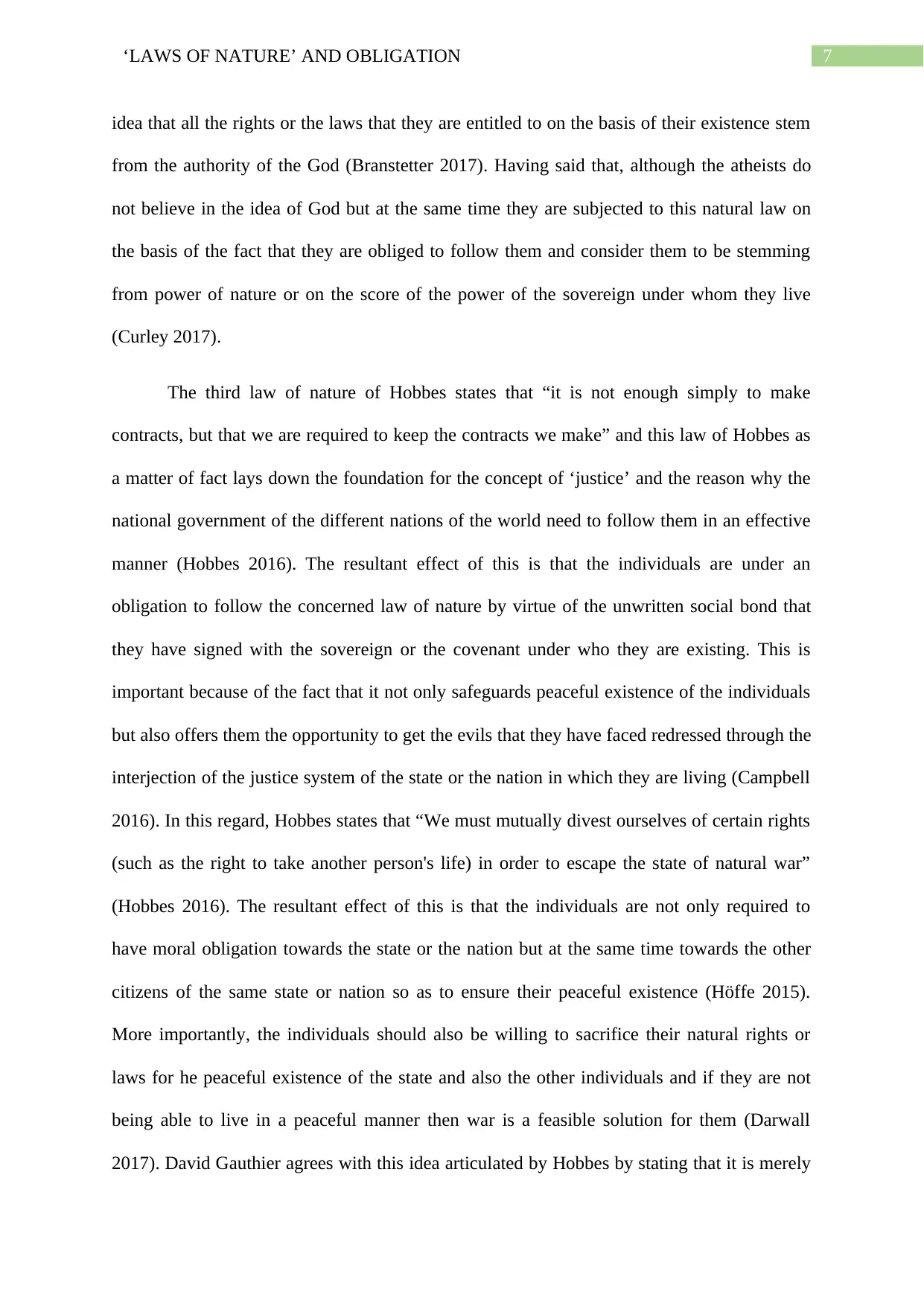
7‘LAWS OF NATURE’ AND OBLIGATION
idea that all the rights or the laws that they are entitled to on the basis of their existence stem
from the authority of the God (Branstetter 2017). Having said that, although the atheists do
not believe in the idea of God but at the same time they are subjected to this natural law on
the basis of the fact that they are obliged to follow them and consider them to be stemming
from power of nature or on the score of the power of the sovereign under whom they live
(Curley 2017).
The third law of nature of Hobbes states that “it is not enough simply to make
contracts, but that we are required to keep the contracts we make” and this law of Hobbes as
a matter of fact lays down the foundation for the concept of ‘justice’ and the reason why the
national government of the different nations of the world need to follow them in an effective
manner (Hobbes 2016). The resultant effect of this is that the individuals are under an
obligation to follow the concerned law of nature by virtue of the unwritten social bond that
they have signed with the sovereign or the covenant under who they are existing. This is
important because of the fact that it not only safeguards peaceful existence of the individuals
but also offers them the opportunity to get the evils that they have faced redressed through the
interjection of the justice system of the state or the nation in which they are living (Campbell
2016). In this regard, Hobbes states that “We must mutually divest ourselves of certain rights
(such as the right to take another person's life) in order to escape the state of natural war”
(Hobbes 2016). The resultant effect of this is that the individuals are not only required to
have moral obligation towards the state or the nation but at the same time towards the other
citizens of the same state or nation so as to ensure their peaceful existence (Höffe 2015).
More importantly, the individuals should also be willing to sacrifice their natural rights or
laws for he peaceful existence of the state and also the other individuals and if they are not
being able to live in a peaceful manner then war is a feasible solution for them (Darwall
2017). David Gauthier agrees with this idea articulated by Hobbes by stating that it is merely
idea that all the rights or the laws that they are entitled to on the basis of their existence stem
from the authority of the God (Branstetter 2017). Having said that, although the atheists do
not believe in the idea of God but at the same time they are subjected to this natural law on
the basis of the fact that they are obliged to follow them and consider them to be stemming
from power of nature or on the score of the power of the sovereign under whom they live
(Curley 2017).
The third law of nature of Hobbes states that “it is not enough simply to make
contracts, but that we are required to keep the contracts we make” and this law of Hobbes as
a matter of fact lays down the foundation for the concept of ‘justice’ and the reason why the
national government of the different nations of the world need to follow them in an effective
manner (Hobbes 2016). The resultant effect of this is that the individuals are under an
obligation to follow the concerned law of nature by virtue of the unwritten social bond that
they have signed with the sovereign or the covenant under who they are existing. This is
important because of the fact that it not only safeguards peaceful existence of the individuals
but also offers them the opportunity to get the evils that they have faced redressed through the
interjection of the justice system of the state or the nation in which they are living (Campbell
2016). In this regard, Hobbes states that “We must mutually divest ourselves of certain rights
(such as the right to take another person's life) in order to escape the state of natural war”
(Hobbes 2016). The resultant effect of this is that the individuals are not only required to
have moral obligation towards the state or the nation but at the same time towards the other
citizens of the same state or nation so as to ensure their peaceful existence (Höffe 2015).
More importantly, the individuals should also be willing to sacrifice their natural rights or
laws for he peaceful existence of the state and also the other individuals and if they are not
being able to live in a peaceful manner then war is a feasible solution for them (Darwall
2017). David Gauthier agrees with this idea articulated by Hobbes by stating that it is merely
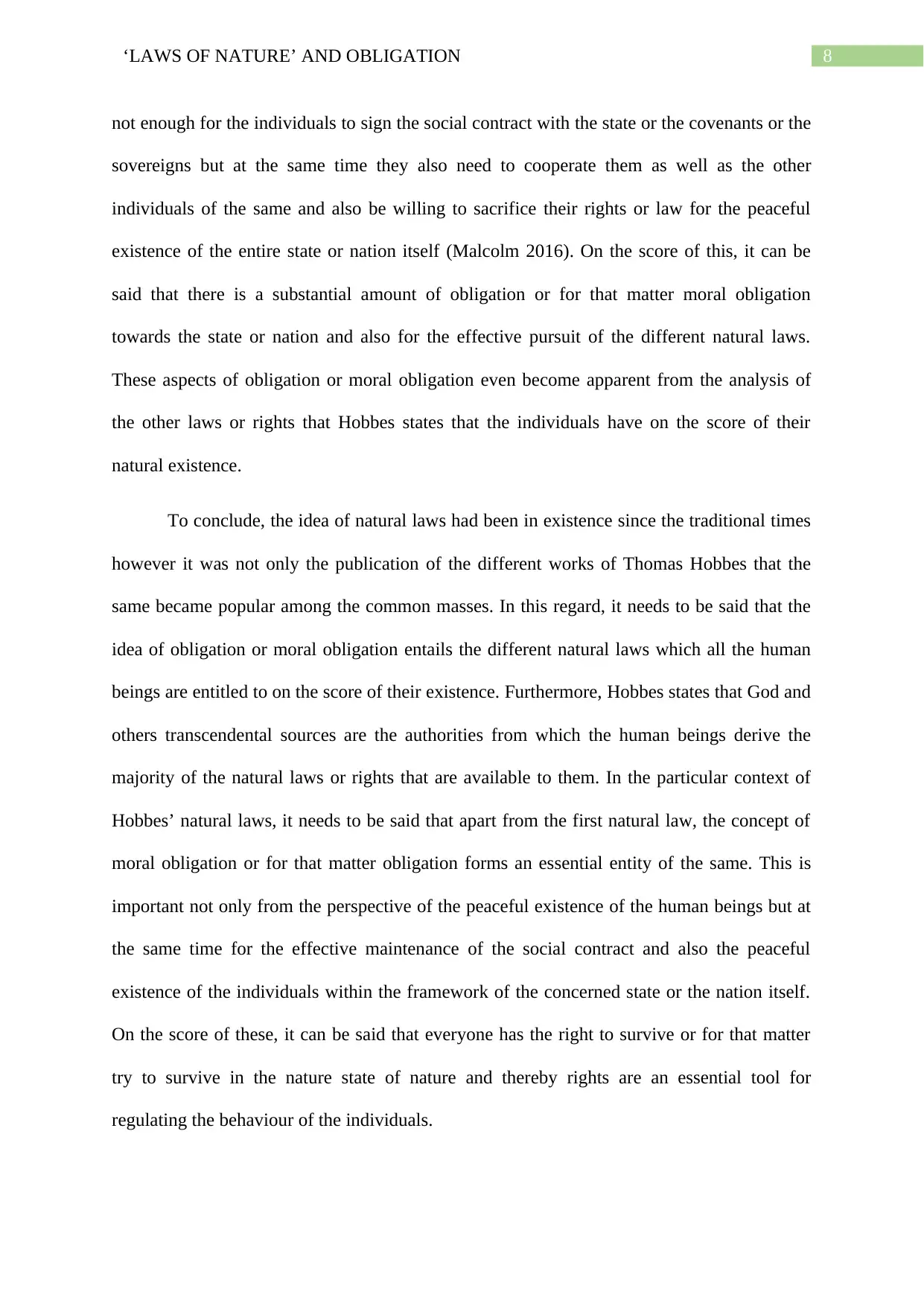
8‘LAWS OF NATURE’ AND OBLIGATION
not enough for the individuals to sign the social contract with the state or the covenants or the
sovereigns but at the same time they also need to cooperate them as well as the other
individuals of the same and also be willing to sacrifice their rights or law for the peaceful
existence of the entire state or nation itself (Malcolm 2016). On the score of this, it can be
said that there is a substantial amount of obligation or for that matter moral obligation
towards the state or nation and also for the effective pursuit of the different natural laws.
These aspects of obligation or moral obligation even become apparent from the analysis of
the other laws or rights that Hobbes states that the individuals have on the score of their
natural existence.
To conclude, the idea of natural laws had been in existence since the traditional times
however it was not only the publication of the different works of Thomas Hobbes that the
same became popular among the common masses. In this regard, it needs to be said that the
idea of obligation or moral obligation entails the different natural laws which all the human
beings are entitled to on the score of their existence. Furthermore, Hobbes states that God and
others transcendental sources are the authorities from which the human beings derive the
majority of the natural laws or rights that are available to them. In the particular context of
Hobbes’ natural laws, it needs to be said that apart from the first natural law, the concept of
moral obligation or for that matter obligation forms an essential entity of the same. This is
important not only from the perspective of the peaceful existence of the human beings but at
the same time for the effective maintenance of the social contract and also the peaceful
existence of the individuals within the framework of the concerned state or the nation itself.
On the score of these, it can be said that everyone has the right to survive or for that matter
try to survive in the nature state of nature and thereby rights are an essential tool for
regulating the behaviour of the individuals.
not enough for the individuals to sign the social contract with the state or the covenants or the
sovereigns but at the same time they also need to cooperate them as well as the other
individuals of the same and also be willing to sacrifice their rights or law for the peaceful
existence of the entire state or nation itself (Malcolm 2016). On the score of this, it can be
said that there is a substantial amount of obligation or for that matter moral obligation
towards the state or nation and also for the effective pursuit of the different natural laws.
These aspects of obligation or moral obligation even become apparent from the analysis of
the other laws or rights that Hobbes states that the individuals have on the score of their
natural existence.
To conclude, the idea of natural laws had been in existence since the traditional times
however it was not only the publication of the different works of Thomas Hobbes that the
same became popular among the common masses. In this regard, it needs to be said that the
idea of obligation or moral obligation entails the different natural laws which all the human
beings are entitled to on the score of their existence. Furthermore, Hobbes states that God and
others transcendental sources are the authorities from which the human beings derive the
majority of the natural laws or rights that are available to them. In the particular context of
Hobbes’ natural laws, it needs to be said that apart from the first natural law, the concept of
moral obligation or for that matter obligation forms an essential entity of the same. This is
important not only from the perspective of the peaceful existence of the human beings but at
the same time for the effective maintenance of the social contract and also the peaceful
existence of the individuals within the framework of the concerned state or the nation itself.
On the score of these, it can be said that everyone has the right to survive or for that matter
try to survive in the nature state of nature and thereby rights are an essential tool for
regulating the behaviour of the individuals.
⊘ This is a preview!⊘
Do you want full access?
Subscribe today to unlock all pages.

Trusted by 1+ million students worldwide

9‘LAWS OF NATURE’ AND OBLIGATION
Paraphrase This Document
Need a fresh take? Get an instant paraphrase of this document with our AI Paraphraser
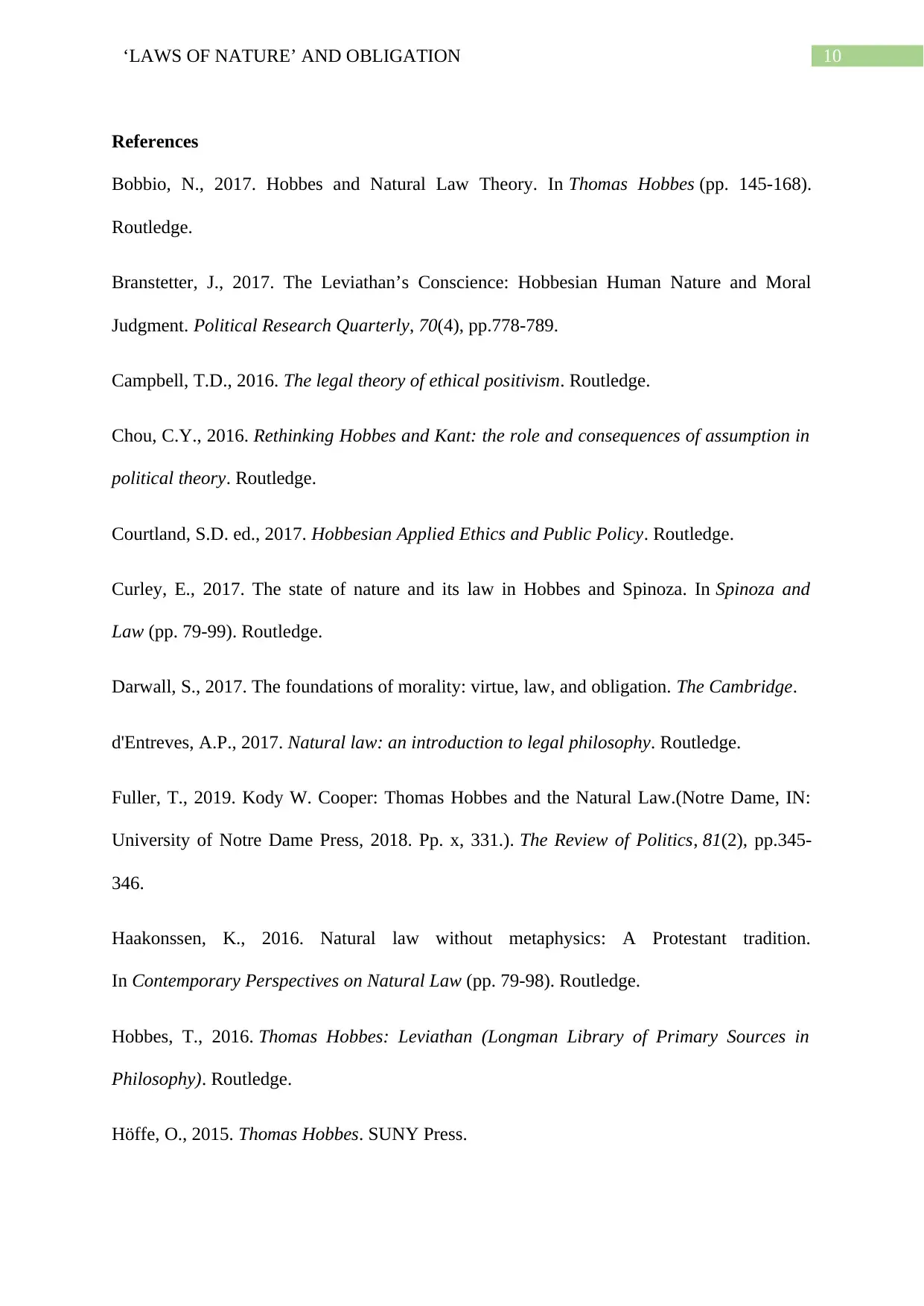
10‘LAWS OF NATURE’ AND OBLIGATION
References
Bobbio, N., 2017. Hobbes and Natural Law Theory. In Thomas Hobbes (pp. 145-168).
Routledge.
Branstetter, J., 2017. The Leviathan’s Conscience: Hobbesian Human Nature and Moral
Judgment. Political Research Quarterly, 70(4), pp.778-789.
Campbell, T.D., 2016. The legal theory of ethical positivism. Routledge.
Chou, C.Y., 2016. Rethinking Hobbes and Kant: the role and consequences of assumption in
political theory. Routledge.
Courtland, S.D. ed., 2017. Hobbesian Applied Ethics and Public Policy. Routledge.
Curley, E., 2017. The state of nature and its law in Hobbes and Spinoza. In Spinoza and
Law (pp. 79-99). Routledge.
Darwall, S., 2017. The foundations of morality: virtue, law, and obligation. The Cambridge.
d'Entreves, A.P., 2017. Natural law: an introduction to legal philosophy. Routledge.
Fuller, T., 2019. Kody W. Cooper: Thomas Hobbes and the Natural Law.(Notre Dame, IN:
University of Notre Dame Press, 2018. Pp. x, 331.). The Review of Politics, 81(2), pp.345-
346.
Haakonssen, K., 2016. Natural law without metaphysics: A Protestant tradition.
In Contemporary Perspectives on Natural Law (pp. 79-98). Routledge.
Hobbes, T., 2016. Thomas Hobbes: Leviathan (Longman Library of Primary Sources in
Philosophy). Routledge.
Höffe, O., 2015. Thomas Hobbes. SUNY Press.
References
Bobbio, N., 2017. Hobbes and Natural Law Theory. In Thomas Hobbes (pp. 145-168).
Routledge.
Branstetter, J., 2017. The Leviathan’s Conscience: Hobbesian Human Nature and Moral
Judgment. Political Research Quarterly, 70(4), pp.778-789.
Campbell, T.D., 2016. The legal theory of ethical positivism. Routledge.
Chou, C.Y., 2016. Rethinking Hobbes and Kant: the role and consequences of assumption in
political theory. Routledge.
Courtland, S.D. ed., 2017. Hobbesian Applied Ethics and Public Policy. Routledge.
Curley, E., 2017. The state of nature and its law in Hobbes and Spinoza. In Spinoza and
Law (pp. 79-99). Routledge.
Darwall, S., 2017. The foundations of morality: virtue, law, and obligation. The Cambridge.
d'Entreves, A.P., 2017. Natural law: an introduction to legal philosophy. Routledge.
Fuller, T., 2019. Kody W. Cooper: Thomas Hobbes and the Natural Law.(Notre Dame, IN:
University of Notre Dame Press, 2018. Pp. x, 331.). The Review of Politics, 81(2), pp.345-
346.
Haakonssen, K., 2016. Natural law without metaphysics: A Protestant tradition.
In Contemporary Perspectives on Natural Law (pp. 79-98). Routledge.
Hobbes, T., 2016. Thomas Hobbes: Leviathan (Longman Library of Primary Sources in
Philosophy). Routledge.
Höffe, O., 2015. Thomas Hobbes. SUNY Press.
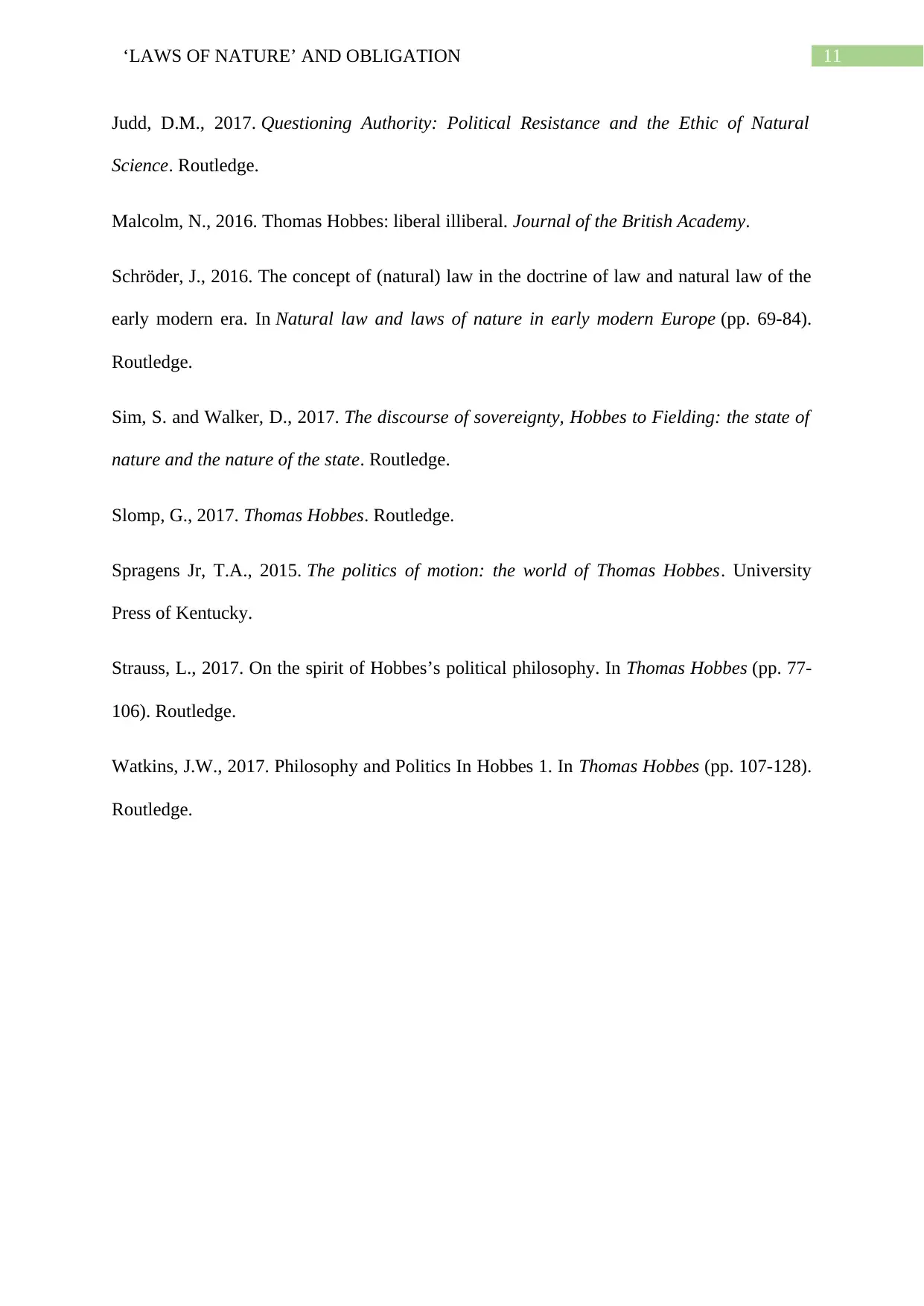
11‘LAWS OF NATURE’ AND OBLIGATION
Judd, D.M., 2017. Questioning Authority: Political Resistance and the Ethic of Natural
Science. Routledge.
Malcolm, N., 2016. Thomas Hobbes: liberal illiberal. Journal of the British Academy.
Schröder, J., 2016. The concept of (natural) law in the doctrine of law and natural law of the
early modern era. In Natural law and laws of nature in early modern Europe (pp. 69-84).
Routledge.
Sim, S. and Walker, D., 2017. The discourse of sovereignty, Hobbes to Fielding: the state of
nature and the nature of the state. Routledge.
Slomp, G., 2017. Thomas Hobbes. Routledge.
Spragens Jr, T.A., 2015. The politics of motion: the world of Thomas Hobbes. University
Press of Kentucky.
Strauss, L., 2017. On the spirit of Hobbes’s political philosophy. In Thomas Hobbes (pp. 77-
106). Routledge.
Watkins, J.W., 2017. Philosophy and Politics In Hobbes 1. In Thomas Hobbes (pp. 107-128).
Routledge.
Judd, D.M., 2017. Questioning Authority: Political Resistance and the Ethic of Natural
Science. Routledge.
Malcolm, N., 2016. Thomas Hobbes: liberal illiberal. Journal of the British Academy.
Schröder, J., 2016. The concept of (natural) law in the doctrine of law and natural law of the
early modern era. In Natural law and laws of nature in early modern Europe (pp. 69-84).
Routledge.
Sim, S. and Walker, D., 2017. The discourse of sovereignty, Hobbes to Fielding: the state of
nature and the nature of the state. Routledge.
Slomp, G., 2017. Thomas Hobbes. Routledge.
Spragens Jr, T.A., 2015. The politics of motion: the world of Thomas Hobbes. University
Press of Kentucky.
Strauss, L., 2017. On the spirit of Hobbes’s political philosophy. In Thomas Hobbes (pp. 77-
106). Routledge.
Watkins, J.W., 2017. Philosophy and Politics In Hobbes 1. In Thomas Hobbes (pp. 107-128).
Routledge.
⊘ This is a preview!⊘
Do you want full access?
Subscribe today to unlock all pages.

Trusted by 1+ million students worldwide
1 out of 12
Related Documents
Your All-in-One AI-Powered Toolkit for Academic Success.
+13062052269
info@desklib.com
Available 24*7 on WhatsApp / Email
![[object Object]](/_next/static/media/star-bottom.7253800d.svg)
Unlock your academic potential
Copyright © 2020–2026 A2Z Services. All Rights Reserved. Developed and managed by ZUCOL.




